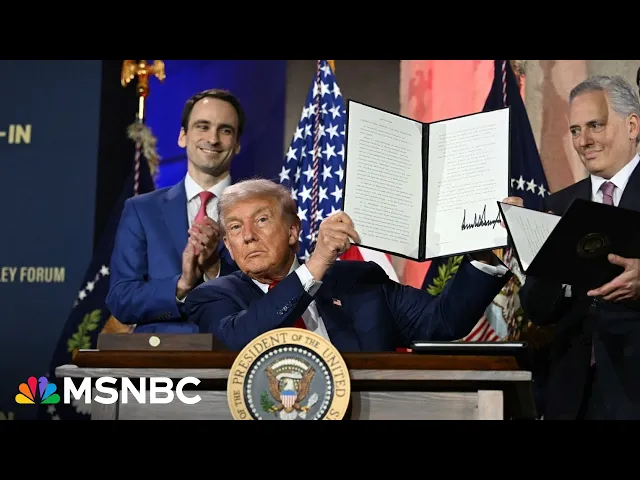No ‘woke AI’: Trump’s new ‘America First’ plan raise big questions about the future of tech

Trump's AI plan could reshape tech landscape
In a landscape increasingly dominated by artificial intelligence, political visions for technology regulation can significantly impact innovation trajectories and market dynamics. Donald Trump's recently unveiled "America First" AI policy framework represents a potential paradigm shift in how the United States might approach AI development and governance should he return to office. The proposal, which takes direct aim at what Trump characterizes as "woke AI," signals a remarkable departure from current regulatory approaches and raises fundamental questions about the intersection of technology, values, and national competitiveness.
Key aspects of Trump's proposed AI approach:
-
Deregulation and "anti-woke" positioning – Trump's plan centers on eliminating what he describes as ideological bias in AI systems, promising to fire regulators he believes are hampering innovation with "woke" requirements.
-
Government licensing system – Despite the deregulatory rhetoric, the plan introduces a potentially expansive government licensing regime for AI developers, creating a contradiction between the free-market language and proposed implementation.
-
Nationalist AI development framework – The proposal emphasizes American dominance in AI, potentially restricting foreign involvement while promoting domestic development with limited international collaboration.
The most striking element of Trump's AI plan lies in its fundamental contradictions. While wrapped in free-market rhetoric and anti-regulatory positioning, the proposal actually introduces a significant new regulatory structure through its licensing requirements. This represents a profound tension between the stated goal of unleashing innovation and the mechanisms proposed to achieve it. The plan effectively substitutes one form of regulation (current Biden administration approaches) with another (a Trump administration licensing system), rather than genuinely deregulating the space.
This tension matters immensely in the context of current industry trends. AI development has thrived in environments where regulatory clarity exists alongside thoughtful guardrails. Companies need predictable frameworks to make long-term investments, and the potential for regulatory whiplash between administrations creates precisely the kind of uncertainty that can chill innovation. Additionally, the global nature of AI development means that nationalist approaches risk isolating American companies from valuable international talent pools and collaborative research ecosystems.
What's notably absent from Trump's proposal is any substantive engagement with the technical challenges of defining and addressing bias in AI systems. The framing of "woke AI" sidesteps the complex reality that all AI systems reflect values in their
Recent Videos
How To Earn MONEY With Images (No Bullsh*t)
Smart earnings from your image collection In today's digital economy, passive income streams have become increasingly accessible to creators with various skill sets. A recent YouTube video cuts through the hype to explore legitimate ways photographers, designers, and even casual smartphone users can monetize their image collections. The strategies outlined don't rely on unrealistic promises or complicated schemes—instead, they focus on established marketplaces with proven revenue potential for image creators. Key Points Stock photography platforms like Shutterstock, Adobe Stock, and Getty Images remain viable income sources when you understand their specific requirements and optimize your submissions accordingly. Specialized marketplaces focusing...
Oct 3, 2025New SHAPE SHIFTING AI Robot Is Freaking People Out
Liquid robots will change everything In the quiet labs of Carnegie Mellon University, scientists have created something that feels plucked from science fiction—a magnetic slime robot that can transform between liquid and solid states, slipping through tight spaces before reassembling on the other side. This technology, showcased in a recent YouTube video, represents a significant leap beyond traditional robotics into a realm where machines mimic not just animal movements, but their fundamental physical properties. While the internet might be buzzing with dystopian concerns about "shape-shifting terminators," the reality offers far more promising applications that could revolutionize medicine, rescue operations, and...
Oct 3, 2025How To Do Homeless AI Tiktok Trend (Tiktok Homeless AI Tutorial)
AI homeless trend raises ethical concerns In an era where social media trends evolve faster than we can comprehend them, TikTok's "homeless AI" trend has sparked both creative engagement and serious ethical questions. The trend, which involves using AI to transform ordinary photos into images depicting homelessness, has rapidly gained traction across the platform, with creators eagerly jumping on board to showcase their digital transformations. While the technical process is relatively straightforward, the implications of digitally "becoming homeless" for entertainment deserve careful consideration. The video tutorial provides a step-by-step guide on creating these AI-generated images, explaining how users can transform...
